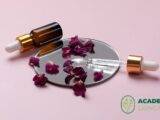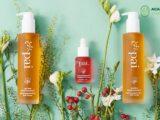Are Jojoba Beads Safe for your skin? Read now!
Last Updated on January 16, 2023 by Aysenur Yashar
If you have ever been interested in face oil, you must have stumbled upon Jojoba Oil. But what in the world are Jojoba Beads then? I did not really need to think about this until I need an exfoliator for a sensitive skin. So the story begins but before moving on, we need to clarify one thing.
Pronunciation.
I hate to admit it but for a long time I was just saying jo-jo-ba literally, but it apparently is ho-ho-ba.
Well that is a good start at least! I think my mispronunciation explains the shocked faces I would get whenever I’d walk into a drug store asking out loud “do you have any jojoba oil?”, not jojoba but maybe they had “ho-ho-ba oil”. Ahaha
If you have ever been interested in face oils you must have heard of jojoba oil. But jojoba beads are something else and in this blog we are breaking down what those tiny yellow spheres are and hopefully doing some proper exfoliation by the end!

Jojoba is not like the other Plants, but why?
If you have been at least a little into skincare, you know Jojoba Oil is everywhere. But what makes it so special? Jojoba Oil as you can guess is made from the plant Jojoba. Jojoba comes from an evergreen drought resistant plant native to North America. The use of the seeds and the fruits of Jojoba has its own botanical and pharmaceutical history. It has been used for very cool purposes for a long time by the natives in the southwestern of the US and northwestern Mexico.
The natives to those areas used Jojoba for some really innovative purposes such as for the treatment of various skin conditions, to boost body’s immunity, to fight against cancer and help in weight loss and wound healing. What a miracle plant for its time! Ahaha!
Although current medicine is not really into using jojoba seeds and oils in cancer treatment, jojoba has many benefits that skincare lovers can enjoy!
Around 50% of the Jojoba seeds are extracted as oil. The golden coloured oil smells and feels really nice and hydrating on our skin, but do not be deceived, jojoba oil is not like the other plant oils! Jojoba Oil is actually not an oil (mini identity crisis alert for Jojoba), it is a wax.
Jojoba Oil is a Wax? Wait what?

So what makes Jojoba Oil different is the chemical composition – it is a wax ester. Wax ester simply means that the Jojoba molecule is one long molecule that contains fatty acid and a fatty alcohol.
To make it clear, most other plant oils are actually triglycerides.
Being a wax ester gives so many unique properties to Jojoba Oil.
Wax is basically the protective barrier over the plants which prevents them from losing water. So you can already guess that Jojoba Oil would form a protective barrier on our skin and lock that beautiful hydration!
More on Jojoba Oil later, let’s get to the juicy part of this article!
What are Jojoba Beads anyways?
To put it simply what we call beads are basically small hard wax microspheres obtained from hydrogenation of jojoba oil.
So we covered that Jojoba is a wax ester and one long molecule. Unfortuanlty, the chemistry does not stop here. One of the key things in chemistry are the double bonds. In other plant oils the double bonds are very close to the centre of the molecule but in Jojoba molecule they are further from the centre.
This distance actually gives Jojoba Oil the ability to be chemically modified into different compounds with different properties. Hydrogenation is one of those techniques and the result is hydrogenated jojoba oil – simply said – Jojoba beads!
Hydrogenation is a standard technique used to increase the properties of plant oils. This reaction improves the texture, odour and stability of the plant oil. This process includes addition of hydrogen to the double bonds (unsaturated carbon-to-carbon bonds) of the molecule.
Simply said adding hydrogen to the Jojoba molecule makes those pearly shaped small spheres that we call jojoba beads.

Jojoba Beads are tiny hard wax spheres which are gentle but effective way of exfoliating skin without creating any strain or irritation.
Are Jojoba Beads Safe for your skin?
Now back to the main focus of this blog! Jojoba beads are made out of jojoba oil so it is worth looking into the safety of jojoba oil first.
Is jojoba oil safe?
The short answer is yes, jojoba oil and its derivatives are safe. One review on the history and many chemical and cosmetic uses of jojoba noted that no toxicity was observed when jojoba oil was applied on the skin. But for hyperallergic people it can create some irritations. All the irritations, on the other hand can go away and are not permanent.
So now the jojoba beads, are they safe?
The same paper touches on the hydrogentated jojoba and clearly states that there is no toxicity.
I honestly could not find scientific papers specific to the safety and toxicity of jojoba beads but there is an abundance of papers covering the benefits of jojoba and its derivates. I have cited the scientific publications I have used below.
What does EWG’s Skin Deep has to say about Jojoba Beads?
Access to transparent information about skincare ingredients is a little tricky for most of us, but luckily EWG’s Skin Deep makes it easy. It is basically a very rich database of the cosmetic and skincare ingredients. The website ranks each ingredients’ safety from 1 to 10 points. The smaller the point the safer the ingredient.
The ranking is based on a scientific analysis. In simple words the masterminds behind the project, read publications mentioning the safety and toxicity of that particular ingredient and then they use this information and give a point.
Here is a screenshot of the score of Hydrogenated Jojoba Oil, in other words Jojoba Beads. You can see that the score is one! Hooray, that means it is a safe product!

Now with the scientific information about its safety and back up from EWG’s Skin Deep, you can use Jojoba Beads wholeheartedly and safely!
If you have been around you know that I am a fan of clean skincare, but unfortunately we have to do the research bit on our own.
If you are like me, skeptic about skincare ingredients and which brands to choose and which not to – this blog here might be a useful guide on checking the ingredients in your cosmetic products.
Other uses of Jojoba derivatives that show safety!
Jojoba is a plant with many properties and derivatives, their safety and usage. Jojoba oil can be combined with other pharmaceutical agents to treat condition like psoriasis. Interestingly jojoba oil can be used to deliver some skin cancer treatment drugs to the deeper layers of the skin!
This is owing to the similarity that jojoba oil has with the natural sebum of human skin. This similarity enables for the transport of those active pharmaceutical agents!
I also looked into the various usages of jojoba and its derivates. There is an abundance of the benefits of jojoba. So it is not surprising that jojoba is one of the most economically important crops worldwide. Let me know if you would like to read a blog about the scientifically proven benefits of jojoba!

Just a small snippet of the benefits then 😉 – One study showed that glycerol and hydrolysed jojoba (another chemical derivative of jojoba oil) work really well together in hydrating dry and flaky skin. No wonder why Jojoba is so often found in skincare products!
My experience with Jojoba Beads and which Products are the best?
First of all, thank you so much for reading so far!
Just a quick recap on what are jojoba beads and what is their purpose:
Jojoba beads are very very tiny wax spheres with a hard texture. Their consistency makes them suitable for gentle yet effective exfoliation. Their waxy nature makes them suitable for exfoliation of any kind of skin type including sensitive and irritable skin types.
Jojoba beads are an excellent example of natural and clean exfoliating skincare. If you have stumbled to any of the other blogs, you can guess that my clean skincare journey always somehow starts with Pai Skincare.
It is not any different here as well! I have a very dry and sensitive skin, so exfoliation is not my skins’ favourite activity. With an urgent need for exfoliation I turned into the brand I trust the most when it comes to sensitive skin – Pai Skincare. Soon I had the Virtous Circle – Kukui & Jojoba Beads exfoliator for sensitive skin in my hands.
You can find out here why Pai is actually a great brand for sensitive skin. If you are wondering whether you, yourself, have sensitive skin and what type of sensitive skin you have, discover more here!
So what is so special about exfoliation with Jojoba Beads?
Before the Virtous Circle by Pai, I had used different exfoliators. Usually the exfoliating ingredients are glycolic acid (AHA), lactic acid (AHA), salicylic acid (BHA) and several more. Whenever I have used them, my skin just broke out more and became even more damaged.
These are slightly more aggressive exfoliators and for someone with dry and sensitive skin, the best exfoliator is a gentle one, that is going to roll over the skin and collect all the dead cells and debris alongside.
My skin turned more flaky and congested. I needed to find a gentle way to decongest my skin. This is where jojoba beads come into play. Small yellowish sphered glide gently on the skin without creating irritation. Plus the jojoba exfoliator I used by Pai also has many natural plant oils like sweet almond oil, kukui oil and avocado oil. So alongside the exfoliation, these plant oils help to plump and hydrate the skin.
Exfoliation with Jojoba beads leaves the skin hydrated, plump and decongested without irritation. Make sure to not push and press too much, just gently roll a small pump of the exfoliator over your face.
After exfoliating make sure to use a moisturiser and a face oil afterwards. If you are not sure which face oil is suitable for you or where to start – Rosehip Oil might be what you need. It is a plant oil with a high amount of Omega 3 and Omega 6 fatty acids and many vitamins. Check this blog to learn which type of Rosehip Oil is suitable for you!
Thank you for reading I really appreciate!
If you have used jojoba beads and want to share your experience, I would love to chat! Let me know how I can improve those blogs to help you with your skincare journey!
References:
- Gad HA, Roberts A, Hamzi SH, Gad HA, Touiss I, Altyar AE, Kensara OA, Ashour ML. Jojoba Oil: An Updated Comprehensive Review on Chemistry, Pharmaceutical Uses, and Toxicity. Polymers (Basel). 2021 May 24;13(11):1711. doi: 10.3390/polym13111711. PMID: 34073772; PMCID: PMC8197201.
- Lin T-K, Zhong L, Santiago JL. Anti-Inflammatory and Skin Barrier Repair Effects of Topical Application of Some Plant Oils. International Journal of Molecular Sciences . 2018; 19(1):70. https://doi.org/10.3390/ijms19010070
- https://incidecoder.com/ingredients/simmondsia-chinensis-seed-oil
- https://www.ewg.org/skindeep/ingredients/719591-HYDROGENATED_JOJOBA_OIL/






